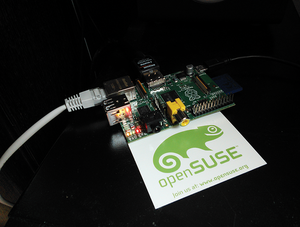News
- First 64-bit OS for Pi 3
- LTE Connectivity
- 3rd Generation Pi Drive
- Pi will outsell the Commodore 64
- Tighter Security for your Pi

CC BY-SA 3.0 (
Raspberry Pi finally has an enterprise grade, 64 bit Linux based operating system. During SUSECon, 2016, SUSE announced that SUSE Linux Enterprise Server (SLES) SP2 will support the Raspberry Pi 3, Model B.
Powered by quad-core ARM Cortex-A53 processor, this device is the first 64-bit product by Raspberry Pi (Trading) Ltd. However to date there have been no 64 bit operating systems to take advantage of it. SLES is the first to do so.
SUSE supports many architectures and the theam have been working with ARM for SLES. "We noticed that the processor on the Raspberry Pi 3 Model B was a Broadcom BCM2837 64-bit A53 ARM processor," Jay Kruemcke, Senior Product Manager – SUSE Linux Enterprise at SUSE, wrote on the SUSE blog [1], "So theoretically, much of the work needed to enable this processor in SUSE Linux Enterprise Server (SLES) had already been done as part of the SLES for ARM project."
[...]
Pages: 4
Price $15.99
(incl. VAT)